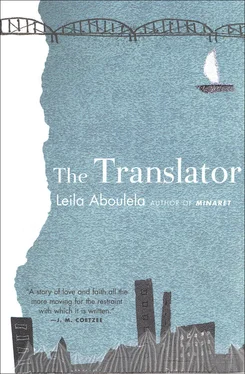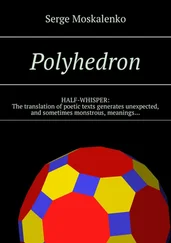Tell him, she told herself, tell him of Mahasen and Tarig and Hanan. Mother, son, daughter. Tell him how you shrugged off your own family and attached yourself to them, the three of them. Made a gift of yourself, a child to be moulded. Their house, where you imagined you would one day live, the empty square in front of it. When it rained, everything stood still and the square took the colour of the moon. Tarig’s bike, Tarig’s room, Tarig singing with imaginary microphones, imaginary guitars, imaginary drums. An obedient niece, letting Mahasen decide how you should dress, how you should fix your hair. You were happy with that, content, waiting for the day you would take her only son away from her. ‘Take care of Tarig,’ she whispered in your ear when you said goodbye. And you brought him back to her shrouded in the belly of an airplane.
‘My aunt is a strong woman,’ Sammar said, ‘a leader really. She is looking after my son now. I haven’t seen them for four years.’ She had given the child to Mahasen and it had not meant anything, nothing, as if he had not been once a piece of her, with her wherever she walked. She was unable to mother the child. The part of her that did the mothering had disappeared. Froth, ugly froth. She had said to her son, ‘I wish it was you instead. I hate you. I hate you.’ In that same death-carrying airplane he had wanted to play, toddle up and down the aisles, all smiles, his father’s ease with strangers. He had wanted food, he was greedy for food. On her lap with the tray precarious before them, he had grabbed rolls of bread, smeared butter, poured the juice on her clothes. Full of life, they said of him, full of life. She pinched him hard when no one was looking. He kicked her back. In the bathroom she cleaned him while he wriggled, his hands reaching for the ashtray, the button that called the hostess. Stop it, stop it. The child would not let her be, would not let her sink like she wanted to sink, bend double with pain. He demanded her totally.
‘Tarig was a student here,’ she said. ‘We came here after we got married. He was a medical student and we lived near Foresterhill. On the day the car accident happened and he was taken to hospital, some of the doctors on duty there knew him. They were very good to me. They called the Ethnic Minority…,’ she stopped, ‘Worker or Coordinator,’ she wasn’t sure what the woman’s title was. Rae shrugged, it didn’t matter. He wiped his face with the palm of his hand, down to his chin and up to press his fingers against his temples.
The coordinator was an energetic woman with curly hair. In the stark, white moments of disbelief, she took the roaming, exploring child, saddled him on her hips and bought him Maltesers from the snack machine. ‘This one is for you, Mama,’ he said when he came back, teeth stained with melted brown. He lifted the sweet to her closed lips, made coaxing noises like the ones she made when she fed him. ‘No, not now, it is for you, all for you.’ She could see the woman on the telephone, gesticulating with her hands. The child whined in anger, stamped his foot, pushed the chocolate against her lips. Against her will she bit into its hushed sweetness, honeycomb and tears. ‘That woman was the one who called the mosque and someone from there came to do… to do the washing.’
A whole week passed before she got him under African soil. It had taken that long to arrange everything through the embassy in London: the quarantine, the flight. People helped her, took over. Strangers, women whom she kept calling by the wrong names, filled the flat, cooked for her and each other, watched the everwandering child so she could cry. They prayed, recited the Qur’an, spent the night on the couch and on the floor. They did not leave her alone, abandoned. She went between them dazed, thanking them, humbled by the awareness that they were stronger than her, more giving than her, though she thought of herself as more educated, better dressed. She covered her hair with Italian silk, her arms with tropical colours. She wanted to look as elegant as Benazir Bhutto, as mesmerising as the Afghan princess she had once seen on TV wearing hijab, the daughter of an exiled leader of the mujahideen. Now the presence of these women kept her sane, held her up. She went between them thanking them, humbled by the awareness that they were not doing this for her or for Tarig, but only because they believed it was the right thing to do.
Their children ran about, her son among them, delighted with the company, excited by the gathering of people. Poor orphan, not yet two, he can’t understand, the women said as he leapt past them with a toy car in each fist, trilling the names of his new friends. But it seemed to Sammar cruel and shocking that he would not stop or pause and that with the same undiminished zest he wanted to play and eat and be held so that he could sleep.
Tarig’s clothes clung wet with hers in the washing machine between the spin and dry cycle.
When they dried she put them with his other things in a black dustbin bag. Packing and giving things away. She filled black bag after black bag, an evacuation. Tearing letters, dropping magazines in the bin, a furious dismantling of the life they had lived, the home they made. Only Allah is eternal, only Allah is eternal. Photographs, books, towels, sheets. Strip and dump into a black bag. Temporary, this life is temporary, fleeting. Why is this lesson so hard to learn? Pens, boots, a torchlight, a comb. The index cards he used for studying. Could you please take these bags to the mosque, someone might need something… A pair of shoes, Tarig’s coat that was nearly new. The tape recorder, the little rug… Strip, give away, pack. We’re going home, we’re finished here, we’re going to Africa’s sand, to dissolve in Africa’s sand.
How did she bring herself to phone Mahasen? To be the bearer of the worst news? And Mahasen’s phone was not working. It had to be the neighbour’s and Mahasen running, breathless, a tobe flung over her nightdress, one roller perched at the top of her head like a purple crest. She was always like that at home, with this one purple roller in her hair. She even slept with it so that when she went out a fringe would peep becomingly from under her tobe.
‘I love your mother more than you,’ she had teased him, hugging her aunt, kissing her cheeks, putting her head on her shoulder. ‘Go away, Tarig, we want to talk,’ she would say laughing. ‘We are going to gossip about you,’ Mahasen would say to him, ‘in little pieces.’ The word for ‘gossip’ meant cutting, too.
This was the Mahasen who now frowned when mentioning Sammar’s name. ‘That idiot girl.’
‘Euphorbia Herimentiana, Cereus Peruvianus, Hoya Carnosa.’ Rae read out loud the names of the cacti. Names that Sammar could not pronounce. ‘Cleistocactus Reae, planted by Silvana Suarez, Miss World 1979. Really?’ He made a face. It made Sammar smile. It was the second time she had seen him outside work and it still felt strange. New and happy like seeing a baby walk for the first time.
The first time had been Saturday when she went to the public library with Yasmin. Yasmin was Rae’s secretary. A glass door connected her office with Rae’s so that when Sammar went to see him, she could see, while they talked, Yasmin furiously typing, her straight black hair hiding her face. Yasmin’s parents were from Pakistan but she was born and had lived all her life in different parts of Britain. She had a habit of making general statements starting with ‘we’, where ‘we’ meant the whole of the Third World and its people. So she would say, ‘We are not like them’, or ‘We have close family ties, not like them.’ There were two other department secretaries who worked in the same room as Yasmin: cheerful, coffee-scented ladies with greying hair and pleated skirts. When one of them once patted the curves of her stomach and bemoaned the fact that she could not stick long to any diet, Yasmin was quick to say, ‘Our children are dying of hunger while the rich count their calories!’
Читать дальше












